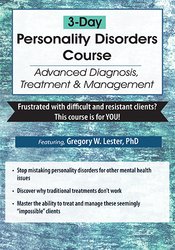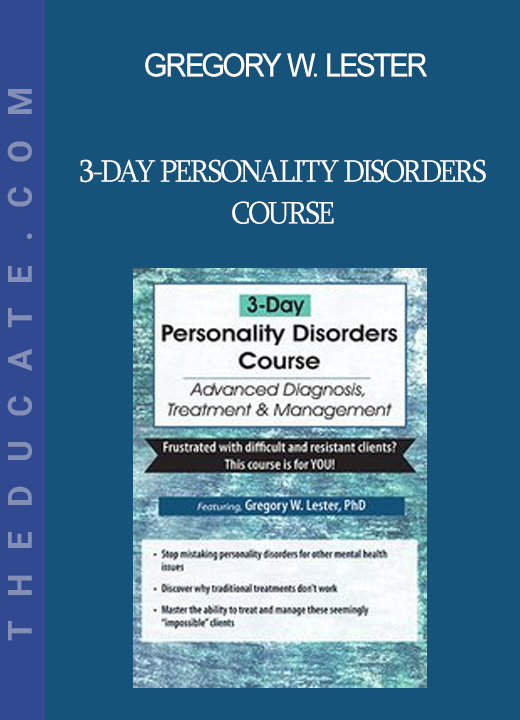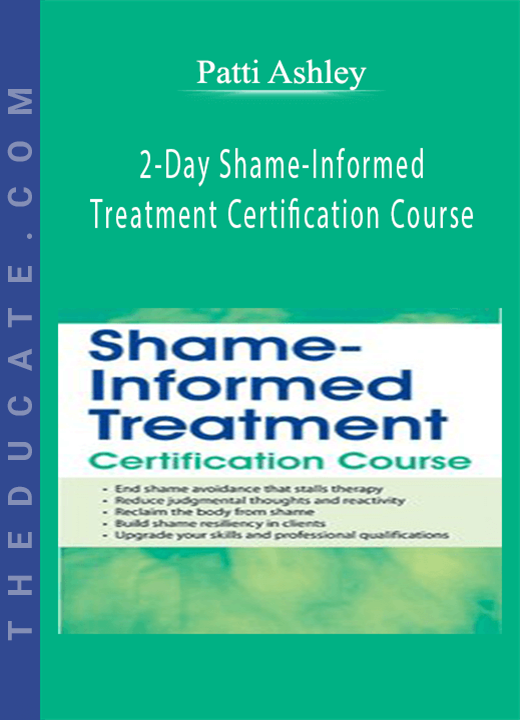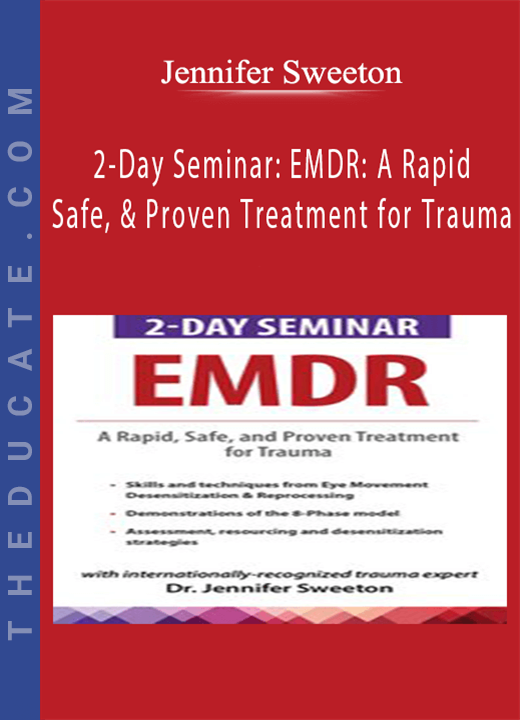Description

- Faculty:
- Gregory W. Lester
- Duration:
- 18 Hours 30 Minutes
- Format:
- Audio and Video
- Copyright:
- Oct 09, 2018
- The Distinction “Personality Disorder”
- Why traditional models of mental health don’t fit
- “Symptomatic” conditions vs. “characteristic” conditions
- The underlying structure of disordered personality
- What makes a personality disorder a chronic condition?
- Why personality disordered people think “it’s everybody else”
- Why “normal” talking with personality disordered people is ineffective
- The Effects of a Personality Disorder
- How personality disordered people create difficulties for themselves and others
- The difference in life pattern between “normal” and “disordered” personality
- How to predict the behavior of individuals with personality disorders
- The type of chaos created by
- Cluster A personalities
- Paranoid Personality Disorder
- Schizoid Personality Disorder
- Schizotypal Personality Disorder
- Cluster B personalities
- Antisocial Personality Disorder
- Borderline Personality Disorder
- Histrionic Personality Disorder
- Narcissistic Personality Disorder
- Cluster C personalities
- Avoidant Personality Disorder
- Dependent Personality Disorder
- Obsessive-Compulsive Personality Disorder
- Cluster A personalities
- Assessment and Diagnosis of Personality Disorder
- Why diagnosis is EVERYTHING in treatment of personality disorders
- 5 steps to identify and diagnose a personality disorder
- Effective, brief, and rapid identification
- Tests and clinical instruments
- Why the Etiology of Personality Disorders Matters in Treatment
- The single biggest mistake clinicians make regarding etiology
- Why misunderstanding etiology will disable interventions
- What causes personality disorders – the definitive conclusion
- Treating vs. Managing Personality Disorders
- Predicting “treatability” of a personality disordered client
- Critical preparation to determine the proper intervention approach
- How to choose an intervention approach
- The structure that makes all interventions effective
- Two common techniques
- Develop effective treatment goals for Cluster A, B, and C personalities
- Select Intervention Based on “Treatability” Level of Client
- Optimal functioning
- Mentalization-Based Treatment
- Transference-Focused Psychotherapy
- Interpersonal Reconstructive Psychotherapy
- Object Relations Developmental Psychotherapy
- Adequate functioning
- Dialectical Behavior Therapy
- Schema-Based Treatment
- Personality-Guided Psychotherapy
- Targeted behavior improvement
- Tactical Therapy
- Strategic Therapy
- Structural Therapy
- Limitations and risks of the psychotherapeutic approaches
- Optimal functioning
- 4-Step Approach to Effective Personality Disorder Treatment
- Engage the treatment relationship
- Apply two fundamental treatment techniques
- Determine category of treatment
- Utilize approach based on client’s diagnosis and treatment goals
- 3-Step Approach to Effective Personality Disorder Management
- Foundation to inhibit disordered behavior
- Implement contingency
- Utilize approach specific to client’s diagnosis
- 3 Must-Have Intervention Techniques for Personality Disorders
- Behavioral Chain Analysis
- Mentalizing interpretations
- Problem-solving process confrontations
- Interventions for Co-occurring Conditions
- Typical co-occurring disorders for the 10 subtypes
- Sequencing interventions for co-occurring conditions
- Medication do’s and don’ts with personality disorders
- Crisis Management: Self-Harm and Suicide Interventions
- Fundamental misunderstandings
- Physiological effects and motivations
- Interventions to reduce or eliminate self-harm
- Harvard’s three distinctions of suicidality
- Interventions for chronic suicidal ideation
- Treatment approaches for acute suicidality
- Unique Considerations
- Personality disorders in children and adolescents
- Intervention modifications
- Couples and family therapy interventions
- Special procedures for interventions
- Working with significant others of a personality disordered individual
- Methods to help them stay out of difficulties
- Coach for effective management
- Self-care for significant others
- Personality disorders in children and adolescents
Gregory W. Lester – 3-Day Personality Disorders Course: Advanced Diagnosis, Treatment, & Management
Description
You know that feeling of tension and anxiety that creeps in after looking down at your schedule and you see THAT client coming in today? The one you secretly dread and hope is a no-show, though here they are, ready and waiting to see you. Or what about the agony of a session that seems to go in circles, leaving you frustrated with no idea what just happened?
How do you differentiate between mental health symptoms and a personality disorder? How do you get past the fear and self-doubt of diagnosing a personality disorder?
In this recording, renowned personality disorders expert, Dr. Gregory W. Lester, answers these questions and guides you through the dramatically different ways necessary to effectively work with personality disordered individuals. You’ll discover everything you need to breakthrough with your most difficult clients.
Imagine the feeling of success the next time that frustrating client is in your office and you’re able to keep the session on track. The empowerment of being equipped with a psychological toolkit of practical interventions that allow you to make clinical gains, rather than putting out fires. The confidence of making an accurate personality disorder diagnosis and knowing you are on the right path with treatment.
Don’t get blindsided or caught up in the drama of difficult clients – gain clarity and confidence in this intensive training with cutting-edge techniques to diagnose, treat, and manage all 10 personality disorder types.
Don’t miss out – this practical, hands-on course recording is a must-have training for all clinicians!
Handouts
| Manual – Personality Disorders Course (1.2 MB) | 200 Pages | Available after Purchase |
Outline
The Essentials of Advanced Assessment & Treatment Effectiveness: Fill in the missing pieces and create a treatment plan that works
Advanced and Empirically Validated Intervention Approaches in Action: A step-by-step plan to implement the most appropriate treatment strategy
Special Issues with Personality Disorders
Faculty
Gregory W. Lester, Ph.D.Related seminars and products: 9
Gregory W. Lester, Ph.D., is a clinical, consulting, and research psychologist with practices in Colorado and Texas. Dr. Lester has presented over 2,000 personality disorders trainings to over 200,000 professionals in every major city in the United States, Canada, and Australia. In his nearly 40 years of clinical practice, Dr. Lester has treated over 1,000 personality disorder cases and has performed psychological evaluations on over 2,500 individuals.
Dr. Lester has served on the graduate faculty of The University of St. Thomas and as a special consultant to The United Sates Department of Justice. Dr. Lester’s office served as one of the original research sites for the DSM-5® revision of the personality disorders section where he collaborated with Emory University, the New York State Psychiatric Group, The University of Missouri, The University of Kentucky, and the late Dr. Robert Spitzer, chairman of the DSM-3 committee.
Dr. Lester is a member of the American Psychological Association, the Texas Psychological Association, and the Colorado Psychological Association. He is the author of nine books, including Power with People, a manual of interpersonal effectiveness, Shrunken Heads, an irreverent memoir of his graduate school training, and Diagnosis, Treatment, and Management of Personality Disorders, which is the largest-selling front-line clinical manual on diagnosing, treating, and managing personality disorders.
Dr. Lester’s research and articles have appeared in publications including The Journal of the American Medical Association, The Western Journal of Medicine, The Yearbook of Family Practice, The Journal of Behavioral Therapy, The Journal of Marriage and Family Therapy, The Handbook of Depression, Transactional Analysis Journal, Living Word Magazine, The Priest Magazine, and The Houston Lawyer.
Speaker Disclosures:
Financial: Gregory Lester is in private practice. He receives a speaking honorarium from PESI, Inc.
Non-financial: Gregory Lester is a member of the American Psychological Association; the Colorado Psychological Association; and the Texas Psychological Association.






Reviews
There are no reviews yet.